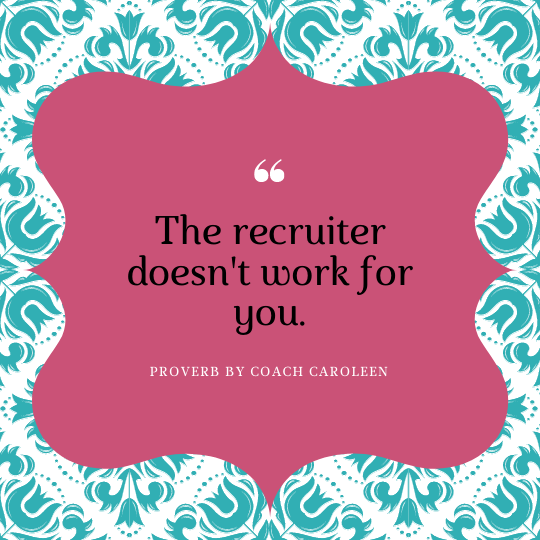Additional menu
As a job seeker, a recruiter can be a very valuable part of your job search process. You want a job. Recruiters have jobs. It’s a match made in heaven. Sounds simple enough, right? It can be that straightforward as long as you understand who pays the recruiter and who they’re ultimately serving. Let’s get some terminology down:
- Candidates - People like you looking for jobs.
- Recruiter - Person paid by the client to recruit candidates for jobs.
- Client - Company that pays recruiters to find candidates for jobs.
Looking at those definitions, you need to understand that as the job seeker, you are the candidate. You are NOT the client. You’re not paying the recruiter. Whenever I share this piece of information, my job seekers give me a look that says “Duh. I knew that.” But once you actually get out there and start working with recruiters, it’s so easy to forget this.

Who does the recruiter serve?
Good recruiters will make you feel like they’re serving you and that they have your best interests in mind. For some recruiters, this is actually true which is great.
When I started working with recruiters, I was confused. Very confused. Some of them acted like they were my friend. Because I didn’t know any better, I thought they were working for me and had my best interests in mind. Sometimes they took me to lunch. Other times, they called to check in on me which I thought was nice.
Of course, it benefits the recruiter to have a good relationship with you. Having open and candid conversations and working in partnership is a faster track to success. Also, once you’re placed in a role, it’s best that the recruiter checks in on you. As long as you’re happy, you’re more likely to perform well and not try to job hop. This reflects well on the recruiter’s selection of you as the winning candidate!
What does the recruiter do?
I live in a big banking city so Wells Fargo is a huge employer in town. Wells Fargo uses both internal and external recruiters (we’ll cover this in another blog) to fill their job openings. The recruiters go out into the world looking for qualified candidates (like you!).
The recruiters review resumes, screen candidates, and then bring a shortlist of candidates to interview. Hiring managers are busy people. They don’t want to spend days on end making job postings and sifting through thousands of resumes. The Applicant Tracking System (ATS) takes the first pass at the resumes which is why I recommend writing a targeted resume. Then the recruiters take a second pass. The recruiters are supposed to weed through the stack and bring the best of the best to interview. This saves the hiring manager from interviewing hundreds of unqualified candidates.
Who pays for all these recruiting services? It’s not you. It’s the client, Wells Fargo. Why does this matter to you? Because you need to keep in mind that the recruiter doesn’t serve two masters. They only serve one master, the client, which in this example is Wells Fargo.
I’m not trying to give recruiters a bad wrap. I use recruiters on a regular basis and they are instrumental in the job hunt. Recruiters and candidates are inherently joined at the hip.
